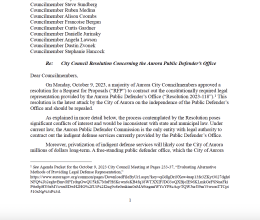DENVER – The City of Aurora has agreed to cancel hundreds of dollars of debt and reimburse nearly $800 in overpayments that James Fisher made to the Aurora Municipal Court while he attempted to resolve rapidly-ballooning fees that he could not afford to pay, according to a settlement announced today by the ACLU of Colorado.
"James Fisher was trapped in a cycle of debt that is all too familiar to thousands of low-income Coloradans ticketed for minor ordinance violations. He made payment after payment to the court, but his debt continued to grow. Although Mr. Fisher eventually paid more than double his original fines, the Aurora Municipal Court kept coming back for more, issuing warrants when he missed a payment,” said ACLU of Colorado Legal Director Mark Silverstein. “With this settlement, Mr. Fisher can finally put this nightmare behind him and move on with his life.”
In 2012, Fisher was sentenced to pay $678 in fines for three municipal ordinance violations – two open container tickets issued on the same night and a citation for driving without proof of insurance.
Over the next four years, while Fisher struggled with homelessness and unsteady work as a day laborer, he nonetheless made 19 separate payments to the Court totaling $1498 – more than twice his original fines. Yet, he still owed the court $860. The Court imposed payment schedules that Fisher could not meet, made each of his due dates a court appearance, and then issued “failure to appear” warrants when he could not make a payment. Municipal courts across Colorado often used these “failure to appear” warrants to coerce payment after the state legislature in 2014 outlawed “failure to pay” warrants in ACLU-backed legislation aimed at curbing debtors’ prisons.
In total, 13 arrest warrants were issued for Mr. Fisher when he was unable to make steady payments. Each new warrant tacked at least $100 in additional fees onto Fisher’s debt. On several occasions, the court assessed fees simultaneously across Fisher’s three cases following a single missed payment. For example, in one instance, Fisher missed a $70 payment that was scheduled in a single case. Aurora assessed a $25 “Failure to Appear Fee” and a $75 “Warrant Fee” in each of his three active cases, totaling $300 for a single missed payment date.
In 2016, Fisher joined the ACLU of Colorado in testifying before the state legislature in support of a new law to stop Colorado municipal courts from using “failure to appear” warrants to collect payment from indigent defendants who cannot afford to pay. House Bill 16-1311 passed with strong bipartisan majorities and was signed into law by Governor Hickenlooper last June.
Subsequently, the City of Aurora voluntarily vacated 2,859 warrants that had been issued for non-payment of outstanding debts. In Fisher’s case, after a negotiation with the ACLU of Colorado, the City further agreed to cancel all of his remaining debt and to reimburse $790 in payments that he had made in excess of his original fines.
“On one hand, I feel like a weight has been lifted off of me. I also feel a sense of pride that I hung in there and fought a good fight,” said Fisher. “I hope this settlement sends a message to the courts and to the community that the ACLU will stand up for people, and that the fight for economic and social justice isn’t over - it’s just getting started.”
“We are thrilled that Mr. Fisher is finally free of the debt cycle that the Aurora Municipal Court had trapped him in for four years,” said ACLU of Colorado Staff Attorney Rebecca Wallace. “But there are still thousands of impoverished Coloradoans who need relief from excessive court debt. Municipal courts across the state, including Aurora, should be revising their debt collection practices to prevent the continuation of the current two-tiered system of justice – one in which wealthy defendants who commit minor violations quickly pay their fines and move on with their lives, while poor defendants remain indebted and tied to the criminal justice system for years, often paying the court significantly more money than their wealthier counterparts to resolve their case."
